Escape: the woman who brought her trafficker to justice
Susan had been on Italian soil for exactly three days when, on 23 July 2015, she was taken with dozens of other new arrivals to a noisy, overcrowded detention centre in Rome, and told she would shortly be deported back to Nigeria. Some women shouted in anger, others started to cry. Susan remained silent. She could not go back.
The previous spring, Susan had been persuaded to make the journey to Italy by a Nigerian woman called Ivie, who she met in her home village in the southern Nigerian state of Edo. The woman had offered to pay for Susan’s journey to Europe and promised she would get decent, paid work when she arrived. Susan underwent a traditional juju oath-taking ceremony, in front of a priest, in which she swore to pay the woman back and to be loyal to her. Now, here in Italy, Susan knew that if she did not repay the debt, there would be terrible consequences.
A lawyer from a voluntary organisation helped Susan make an asylum application that would allow her to remain in the country, and after a few more weeks in detention she was transferred to a migrant reception centre in central Italy to wait for her case to be processed. Soon after, Ivie picked her up and brought her to an apartment in Prato, outside Florence. Four other young Nigerian women were already living there. One of them handed Susan a pair of high-heeled shoes and a short skirt. “Let’s go,” she said. “We have to work.”
If she didn’t pay, or if she spoke about it to anyone, her mother and brothers back home would be in danger
Susan thought it must be a joke. She had been promised work as a babysitter or a supermarket cashier. “They didn’t tell me I would come here to be a prostitute,” Susan told me. But the women around her were not laughing. When she protested, Ivie reminded her that she had paid for her journey, and of how much money she owed. If she didn’t pay, or if she spoke about it to anyone, her mother and brothers back home would be in danger. “I was crying,” Susan told me. “The other girls said: ‘You’ll get used to it’. I said: ‘I’ll never get used to it.’”
There were no days off. Susan was never alone, but she felt isolated. Ivie had created a hierarchy, making it hard for the girls to bond. Hillary, another young woman from Edo state, had been given the role of collecting the money at the end of the night and checking on the girls. Susan’s survival strategy was to avoid the men who came looking for sex – to work as little as possible. In January she made only €420. Frustrated by Susan’s poor earnings, Ivie hit her so hard that Susan was afraid she was going to lose the sight in one eye.
One day at the end of January, five weeks after Susan had arrived in Prato, Susan was moved to another town in the north of Italy. Ivie controlled her from afar, calling her often, and her new madam pressured her for money. “I couldn’t continue like that. Every night in the rain, every day,” Susan said. The hardest thing to bear was that her sacrifice was not even helping her family in Nigeria. “They didn’t let me send any money home.”
Since 2015, about 21,000 Nigerian women and girls have arrived on Italian shores. In 2017, the UN’s International Organization for Migration reported that 80% were potential victims of sex trafficking, but numbers are hard to confirm. Italy has been the stage for a cruel cycle of exploitation in which survivors of trafficking, after years of forced prostitution, have become traffickers themselves, the so-called “madams”. Some of them bring new women to Italy in order to finish paying off their debt to their traffickers and find a way out of the streets, and others have been exploited for so long that they see exploitation of others as their only option for a better life.
“Criminal organisations are always ahead of us”
Victims are generally afraid to come forward, and few traffickers have been identified. The UN Convention against Transnational Organized Crime, a key tool in international law to prosecute traffickers and protect survivors, states that survivors of trafficking should be offered temporary or permanent residence. Italy was a major proponent of the convention, which was signed in Palermo in December 2000. But since then, as more migrants have arrived, the political landscape has changed.
After 2009, when Italian law made it a criminal offence to enter and stay in the country without a visa, the fear of being arrested forced undocumented migrants to go underground. Victims of trafficking are rarely identified during immigration controls. Even if they are identified as possible victims, under questioning, many women struggle to recall details of their journey. “They don’t remember the name of the city they were transferred to, so they are not considered believable,” Carla Quinto, a lawyer working with the anti-trafficking organisation Be Free, told me.
If they are believed, gathering evidence for the three elements constituting the crime of human trafficking – recruitment, transfer and exploitation – presents further challenges: the difficulty of co-ordinating international investigations with police from the countries of origin, the lack of sympathy or support from many police officers and prosecutors in Italy, and the fact that Nigerian criminal groups behind human trafficking sometimes collaborate with the local mafia for protection. Investigations are complex and often slow, while traffickers move quickly, relocate their victims frequently and change their phone numbers multiple times. “Criminal organisations are always ahead of us,” Quinto said.
But in February 2016, a magistrate specialising in organised crime, Angela Pietroiusti, launched an investigation that would cut through layers of prejudice and bring the expertise of anti-mafia units to bear on sex trafficking. Over the course of a year, the investigation uncovered a sophisticated network of traffickers operating between Nigeria, Libya, Italy, France, Germany and the UK, which recruited young women and girls, and brought them to Europe.
Key to this investigation were the detailed notes and photographs that one woman, outraged at being forced into prostitution, had amassed in secret. That woman was Susan.
Francesca De Masi has been visiting the Ponte Galeria women’s detention centre in south-west Rome every week since 2008. Her task is to identify human trafficking victims among the detainees, offer them counselling and legal help, and get them moved to a shelter. On Wednesdays, De Masi and her team Be Free usually set up in Ponte Galeria’s library, a dark room with few books and many mosquitos. Sometimes she and her colleagues approach the detainees in the corridors; sometimes it’s the women who enter the library and strike up a conversation. The first few minutes of the exchange are crucial. Female traffickers could be in detention together with their victims. “We can’t say openly that we are an anti-trafficking organisation,” De Masi explained.
Once every two weeks, Quinto, Be Free’s in-house criminal lawyer, joins the team in Ponte Galeria to help women who want to press charges against their traffickers. Quinto and De Masi share a passion for cigarettes, and the affectionate, brutal intimacy of siblings. Quinto speaks as if she is always in a hurry. “Sometimes I kick her under the desk,” De Masi laughed – the kick is her sign to Quinto to slow down. “Some of the women need time to open up.”
There were no days off. If she had a fever, or had her period, she had to work
When she heard the news, in July 2015, that 66 young women from Nigeria, who had just arrived by boat in southern Italy, had been flown to Rome and taken to Ponte Galeria, De Masi had grabbed her car keys and rushed out the door. That day was like nothing she had ever experienced. The women were terrified. Susan was among them, exhausted but determined to avoid deportation. The room where the women were held was overcrowded and hot. To make themselves heard above the panicked and bewildered voices, De Masi and other aid workers climbed on to a table and shouted. They explained that they would need to speak to each of the women individually.
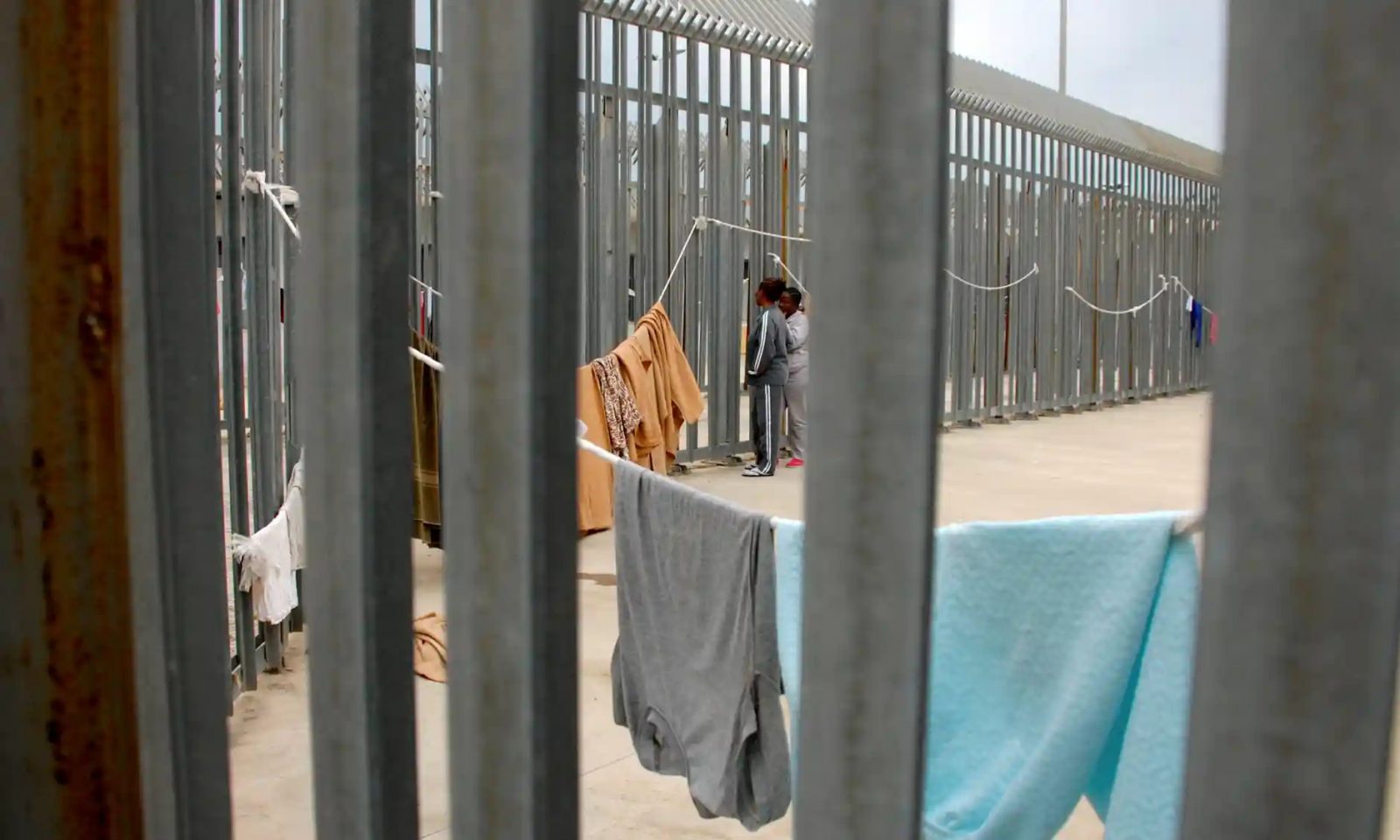
Women being held in the Ponte Galeria detention centre for migrants near Rome in 2017. Photograph: Reuters Staff/Reuters
When Susan’s turn came, De Masi approached her and asked: “Who brought you here?”
“Nobody,” Susan replied firmly. She had sworn her loyalty to Ivie, the woman she met in Edo state. She did not yet know what Ivie had in store for her. Susan’s main concern was to stay in Italy and protect her patron at all costs.
After a few failed attempts to gather more of Susan’s story, De Masi, together with the immigration lawyer, helped her file an asylum application. This would protect her from deportation, but because she would not admit that she was recruited in Nigeria, Susan had to remain in the detention centre until the interview with the asylum commission, which was scheduled a month later. Then she would be transferred to a migrant reception centre.
De Masi feared that if Susan was transferred to the reception centre, she would be picked up by her trafficker. Reception centres for adult migrants have become connection hubs between traffickers and their victims. In some cases, suspected traffickers walk right into migration centres to pick up their targets.
De Masi’s fears proved correct. Once she got to the reception centre, Susan managed to get hold of a phone and re-established contact with Ivie. After two months, Ivie came in a car to collect her. And with that, Susan disappeared.
In Prato, Susan found herself living a nightmare. Enraged by her meagre earnings, Ivie would yell at her: “You’re not a serious girl.” She was forced to work the streets every night, from 5pm until 3am, standing in the cold and rain. There were no days off. If she had a fever, or had her period, she had to work.
Every transaction she wrote down was evidence of what she was forced to endure
Furious about the lies she had been told, Susan decided to document her new life in Italy. She began taking pictures on her phone of the apartment where she was kept, and even snapped surreptitious photos of Ivie. She kept records of phone numbers and notes of what happened to her. At the time, she wasn’t sure she would be able to do anything with them, but she wanted evidence of what she was being forced to endure. Ivie had given her a notebook in which Susan was supposed to write down the amount of money she gave Ivie each week, and how much she still owed. The notebook was a record of Susan’s debt bondage – a reminder that if she met more clients and made more money, she could supposedly earn her freedom more rapidly. Susan, however, used the notebook to record her experience. Every transaction she wrote down was evidence of what she was forced to endure.
After Susan was transferred to the new city in northern Italy in January 2016, she kept recording as many details as she could. At first, her life was controlled by a new woman who kept close watch over her. But about a week after her arrival, the new madam went on a trip to Nigeria, leaving Susan with another woman whose control wasn’t as tight. “That’s when I decided to leave,” Susan said.
One morning in early February, she packed her phone and notebook in a small purse and left the house, saying she had to meet a client in a nearby town. Instead, she walked to the train station, intending to travel to Rome. She had managed to keep the contact details of the immigration lawyer she had seen at the Ponte Galeria detention centre in July 2015. Susan tried to keep a low profile at the train station, terrified that someone might recognise her, but she had no cash, and had to stop strangers to beg for money to buy a ticket.
When she finally made it on the train, her phone began to ring. Both Ivie and the new madam were calling her. Susan knew that if she kept ignoring their calls, they would realise something was wrong. She was especially afraid that there would be retaliation against her mother. She had to come up with a good excuse. She finally picked up and told Ivie she could not talk because she had been caught by the police. She repeated the same line when the madam called. She then threw away her sim card, praying that they would believe her, and leave her and her family alone.
‘Susan is back.” The immigration lawyer was on the phone to De Masi. Susan had made it to Rome, and found the lawyer’s office before nightfall. “She has nowhere to go.” An hour later, De Masi was at the lawyer’s office. Five months had passed, and Susan looked very different from the distant and defensive girl De Masi had met in Ponte Galeria. “She was outraged that someone she had trusted could put her in danger,” De Masi told me. This time Susan wanted to talk. She wanted justice. “She was angry as hell,” said De Masi.
After De Masi picked Susan up from the immigration lawyer’s office, she helped to get her into a shelter. In the weeks that followed, she began to gather Susan’s testimony. Susan’s information was detailed, reliable and well documented. “She had provided a copy of her notebook, photos, names and personal information about her traffickers,” De Masi said. Filing criminal justice complaints is a way for women who have been trafficked to regain a feeling of power, De Masi said. Be Free’s lawyer Carla Quinto pointed out that it can also afford them better protection: if traffickers threaten a survivor after she presses charges, police forces are usually quicker to intervene.
Even with the evidence Susan had amassed, De Masi and Quinto knew how hard it would be to put together a case against her traffickers. Of the 70 survivors’ cases that Be Free handles every year, no more than three go to trial, and almost never for human trafficking or slavery. Criminal charges are usually dropped, or reduced to exploitation of prostitution, which is a misdemeanour. “In the end, many cases go to trial for minor crimes with evidence that is easier to get,” Quinto explained.

A woman who had been trafficked from Nigeria to Italy, 2014. Photograph: Elena Perlino/Rex/Shutterstock
The difficulty of bringing traffickers to justice is a global problem. The International Labor Organization (ILO) estimates that there are currently about 40 million victims of modern slavery in the world, more than the population of Canada. Yet, at a global level, fewer than 12,000 prosecutions are brought against traffickers every year, resulting in fewer than 10,000 convictions.
One reason convicting traffickers is so hard is because the crime usually involves large numbers of criminals working in multiple jurisdictions. At each step along her journey to Europe, Susan had been picked up by different sets of middle men, who were co-ordinating their operations via phone with Ivie, her madam in Italy. In Libya, Susan had been locked up for two weeks in a makeshift jail, crowded with people who were waiting to cross the sea to Europe. The madam would regularly check in with the Nigerian and Arab men who served as jailers. The lack of investigative collaboration with Nigeria, Niger and Libya made it impossible to investigate or prosecute any of the middle men involved in Susan’s trafficking.
The number of investigations into trafficking to Italy dropped steeply from 2014 onwards, just as there was a spike in arrivals of Nigerian women and girls without visas. According to a US state department report, published in June this year, only 135 people in Italy were investigated for trafficking in 2019, compared to 314 in 2018, and 482 in 2017. The report said the Italian authorities “did not meet the minimum standards for the elimination of trafficking”. The lack of interpreters from west Africa who can translate intercepted phone calls was one obstacle. But people working with survivors believe that there is a widespread lack of interest in prosecuting traffickers, due in part to the fact that a large number of survivors are Black women.
She saw the criminal complaint as the only means to fight back and protect her family
De Masi, who has worked for Be Free for more than 20 years, believes the hardening of attitudes towards migrants among Italian law enforcement authorities is not a recent phenomenon. After the Balkan wars and the rise of organised crime in post-communist eastern Europe, De Masi and her colleagues noticed increasing numbers of women who were being trafficked for sex. At first, it was often the police who would bring women off the streets to the shelter. But after Silvio Berlusconi’s rightwing government issued new legislation in 2009 to clamp down on undocumented migrants, the police attitude towards sex-trafficking victims started to change. “The police priority was no longer to bring survivors to an anti-trafficking organisation or to women’s shelters and help them,” De Masi said. “What became crucial was whether women had their documents in order. Criminalisation of migration became the priority.”
In spite of the danger to witnesses and their families, the Italian system puts the onus on survivors to press charges against their traffickers. If survivors do file a complaint, their families back home are at risk of retaliation. Under an agreement between Italy and Nigeria, Italian police forces may alert Nigerian authorities so that they can protect survivors’ relatives once a complaint has been filed, but this measure has proven ineffective. De Masi says that whenever she has made a request to protect a woman’s family, the Nigerian authority responsible for fighting human trafficking has failed to respond. Several of Quinto’s clients’ families have been attacked. In one case, a survivor’s mother was killed.
In March 2016, about a month after Susan fled to Rome, Ivie sent men to her mother’s house in Nigeria. They beat her badly and left a message for Susan: “Go back to your madam.” The threat had the opposite effect. After her mother told Susan what had happened, she grew more determined than ever. She saw the criminal complaint as the only means to fight back and protect her family.
In May, a criminal complaint was filed against Ivie on Susan’s behalf. De Masi and Quinto knew Susan’s chance of winning justice was small. According to Quinto, the outcome often depends on the attitudes of whoever happens to be the prosecutor on the case. Previous complaints had been dismissed by police officers, investigating magistrates and prosecutors who did not take the women’s stories seriously, or dragged their feet, given the difficulty of gathering enough evidence for a successful prosecution. But this time, they were in luck.
Susan’s case ended up in the offices of the anti-mafia directorate in Florence, close to where she had been forced into prostitution for the first time. Because of their complexity, in Italy human trafficking investigations are managed by local anti-mafia directorates – special prosecutors’ units created in the early 90s to coordinate investigations into organised crime in Italy.
The woman who picked up her file was an experienced special prosecutor named Angela Pietroiusti. Five months earlier, she had launched an investigation into sex trafficking in Tuscany, and ordered surveillance of the apartment in Prato where Ivie kept the girls. She was building a case by following the women’s activities, but needed access to communications between the traffickers.
In trafficking cases, witnesses need both physical protection – and emotional support
“The information offered by Susan’s criminal complaint coincided perfectly with what we were finding in our investigation,” Pietroiusti told me. “She was incredibly reliable. She provided her madam’s phone number and the names of the other girls.” As one of the few prosecutors handling human trafficking cases in her office, Pietroiusti was able to make a connection between Susan’s criminal complaint and the investigation she had recently started. Thanks to the detailed information Susan had provided, in June 2016 Pietroiusti obtained authorisation for a wiretap.
“Trafficking cases are as complex as mafia cases,” Pietroiusti told me when I met her in her office overlooking the city of Florence, with Brunelleschi’s dome and the Tuscan hills in the distance. Pietroiusti is in her early 60s, and that day was wearing a sparkling blue glittery top, which made for a vivid contrast with metal detectors at the entrance of the building and the security guards outside her office – grim reminders of the dangers of her work. She remembers the names of all the survivors of the cases she worked on, and those of their traffickers.
Once they got the wiretaps in place, together with police officers and translators, Pietroiusti spent hundreds of hours building the case. One of the challenges was finding people who could translate from Igbo into Italian. The Nigerian community in Italy is not large, and most recent migrants are afraid of causing trouble for themselves and their families. “But we managed to find some of them,” Pietroiusti said with a smile.
Wiretaps and surveillance revealed that Ivie was part of an international network. Together with other madams, she moved young women, some under 18, across several European countries. The investigation also revealed that Ivie had herself worked in the streets as a sex worker for a few years before becoming a madam. She had built a thriving business, and trained her 24-year-old daughter to run it for her, exploiting women her own age and younger. Half a dozen people were investigated, but in January 2017, just four madams, including Ivie’s daughter, were indicted for trafficking 17 young women and girls from Nigeria to Italy.
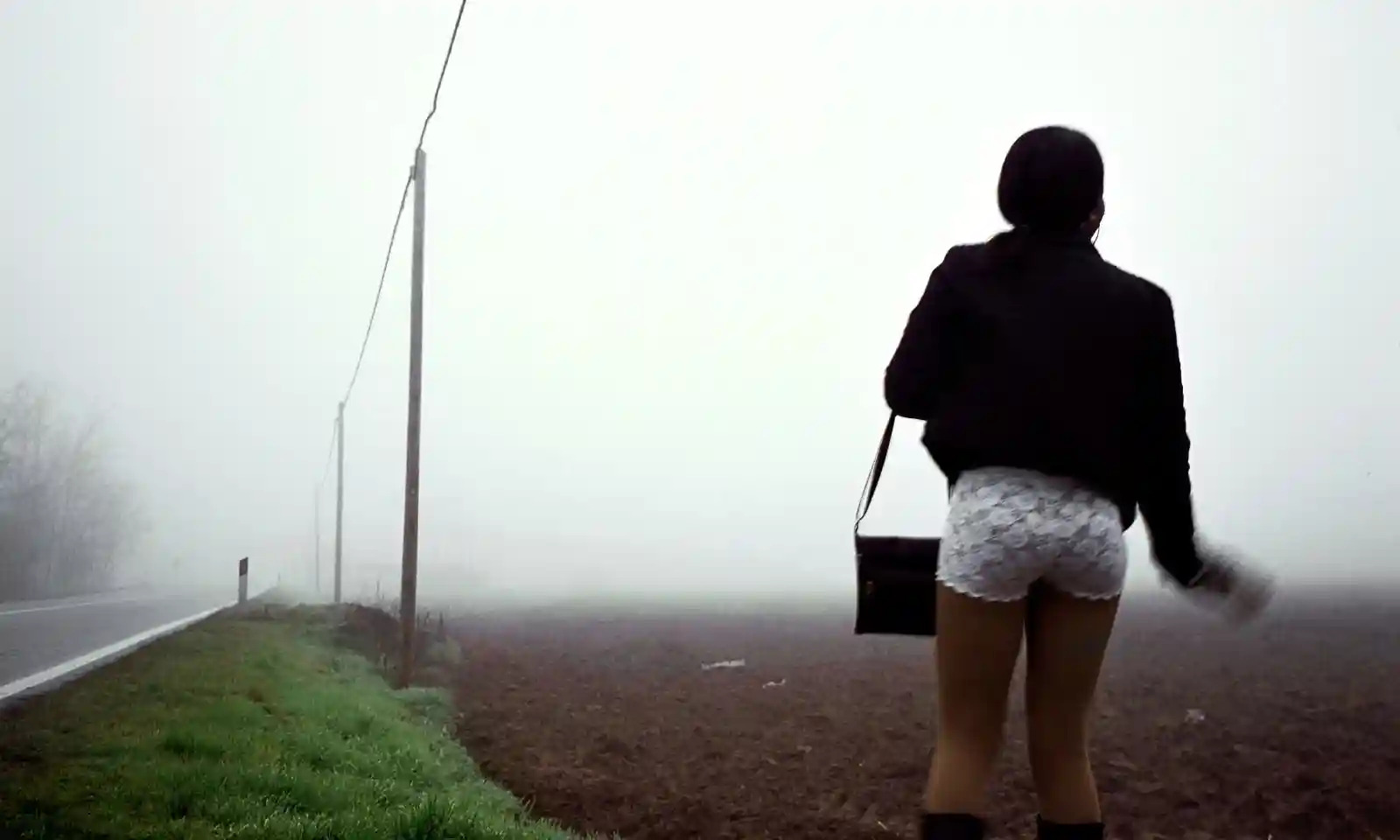
A trafficked Nigerian woman in Italy in 2014. Photograph: Elena Perlino/REX/Shutterstock
It had taken Pietroiusti a year to gather enough proof to file a request for an arrest warrant, and it would take two more years for the judge to sign it. By the time the four madams were arrested, it was three years since Susan had filed her criminal complaint. Complex cases, such as ones involving human trafficking, tend to be passed over by judges, Pietroiusti said with a sigh, as they require more time and work to evaluate. Susan’s case involved thousands of pages of phone records and transcribed conversations. “I am not without sin,” Pietroiusti told me, “but among all the requests I get, I try to prioritise those cases that threaten human dignity.”
In trafficking cases, witnesses need both physical protection – they often live in shelters with secret addresses – and emotional support. Some survivors are so scared of their traffickers that they deny they were trafficked and forced into prostitution, even when they are presented with the evidence. Interviewing them requires careful strategy and sensitivity. To make the process less traumatic, sometimes Pietroiusti travels long distances to meet them in their secret shelters, where they feel more secure. Pietroiusti also has a rule: she only asks questions when it is strictly necessary. “The less you interview them, the better it is,” she told me. “It’s hard for them.” There is also a need for absolute confidentiality. “As much as you can recommend them to keep it private, they are still girls – they might talk to a friend about it, and word of the investigation may get around.”
“You didn’t come to Europe to play!”
In addition to witness testimony, the wiretaps also offered a window into the violence that the victims experienced on a daily basis. One underage girl, Marianne, was raped at a gunpoint by a client – a man who had posed as a police officer – and then forced to get an abortion. She had been trafficked to Italy in 2016 by the same woman who had brought Susan from Nigeria. The madam was frustrated by Marianne’s meagre earnings: “You didn’t come to Europe to play!” she shouted at her in a phone conversation that was intercepted by agents.
In August 2016, once she had realised Marianne was under 18, Pietroiusti instructed police officers to stop her in the streets and take her to a shelter for minors while surveillance on the other women continued. But Marianne, frightened and alone, ran away and went back to the madam, the only adult she knew in Italy. The fact that victims are undocumented, and tend not to trust the police, means they become even more dependent on their traffickers.
When police officers stopped Marianne again and tried to put her in a shelter for the second time, she escaped again. This time the madam transferred her to France, together with another underage girl. The trafficker called them “the little ones”, Pietroiusti said. By the time arrest warrants were issued for the four Nigerian madams, police had lost all trace of the girls.
Cases such as these take a toll. “They don’t let you sleep at night,” Pietroiusti said.
When De Masi learned that Susan’s evidence had finally led to arrests, she was taken aback. “So much time had passed, I thought the case had been dismissed,” De Masi told me. A pre-trial hearing was set for July 2019, and Susan took the train to Florence. She was nervous but determined. Seeing De Masi and Quinto waiting for her at the station was a relief.
Be Free rented an apartment so that Quinto could help Susan prepare for the hearing. The lawyer established the most important thing: that the woman who had trafficked Susan would not see her. The judge would hear the witnesses in court, one by one, but the defendants would be in a separate room in the courthouse, following their testimonies via videolink. The survivors’ faces would not be on camera, only their backs.
“Clients like me because I don’t look like a lawyer”
“You deserve the princess room,” De Masi told her, giving her the biggest room in the apartment, with a queen-size bed and a television. Susan laughed, pleased with the privacy and comfort. She had spent years in a shelter, sharing her room, bathroom and kitchen with other women. Before going to sleep, Susan took some selfies with De Masi and Quinto. “It was nice to stay with both of them, they are so funny,” Susan told me, laughing. She reminded me what Quinto, who has salt-and-pepper short hair and always wears jeans and tennis shoes, often says: “Clients like me because I don’t look like a lawyer.”
The morning of the hearing, Susan wore a bright T-shirt with the words: “I must be successful.” Nine survivors were due to speak as witnesses in the trial. To protect them from crossing paths with their traffickers, Pietroiusti invited them to wait in her office. As more survivors arrived, Susan remembered her time with the girls as a stretch of lonely, desperate days. Seeing Hillary particularly upset her. “She is bad,” Susan told De Masi, remembering how Hillary would control her and the other girls. De Masi told Susan she believed Hillary was a victim like her.
Hillary was the only one who had paid back her €30,000 debt entirely. Her madam had celebrated the final payment by asking for another €2,000 as a “gift” and offering Hillary the opportunity to become a madam herself. Hillary’s father, who lived in Nigeria, had been working closely with Ivie, and had recruited his own daughter, as well as other girls. The investigation revealed that he had pressured Hillary to work overtime, so that she could pay her debt and become a madam – something that she never did.
As Susan waited her turn to give evidence, there were moments of tension. One of the survivors got a bad headache. “It’s the juju!” she screamed, convinced that she was being punished because she was about to betray her madam, to whom she had sworn an oath of loyalty back in Nigeria. The traditional ritual is very frightening, and exerts power over the young women long after they have left their home. “Using these very old belief systems passed down through generations is a psychological form of control that is much stronger than any violence,” Princess Inyang Okokon, who runs Piam Onlus, an anti-trafficking NGO, told the Guardian in 2017.
“I started telling the truth, and I became so relaxed”
As other women got anxious, De Masi took out her phone. In 2018, she had spent two months in Nigeria’s Edo state to research the country’s anti-trafficking efforts. That year, in an attempt to curb trafficking to Europe, Oba Ewuare II, the spiritual ruler of the kingdom of Benin, held a sacred ceremony to revoke all curses that sealed the debt bondage and set victims free. De Masi, who had been present, showed a video of the ceremony to the girls. “Everybody calmed down,” she told me.
When Susan’s turn to see the judge came, she was shaking, but she quickly got over her nerves. “I started telling the truth, and I became so relaxed,” she told me. She said it felt like a weight had been lifted from her.
The trial was set for five months later, on 13 December 2019. The defendants had chosen a fast-track trial – a tool in Italian law that speeds up the criminal process and, in case of conviction, allows a reduction of the sentence. The trial would last just one day. None of the victims were required to attend in person, but De Masi and Quinto were there to see the traffickers, who had caused so much pain and suffering, brought to justice. “There was no way I was going to miss this day,” De Masi told me.
After the closing arguments, prosecutor Angela Pietroiusti invited De Masi and Quinto into her office to wait for the judge’s decision. They made small talk and chain smoked. At 7pm, Pietroiusti’s landline rang.
The four defendants were sentenced to a total of 45 years for trafficking 10 girls to Italy and forcing them into slavery. When she heard the sentence, De Masi cried. “It was as if justice had been served not only for Susan, but for all the other women we had worked with,” she told me. De Masi and Quinto bought a bottle of wine to celebrate on the train back to Rome. As their train was leaving, they called Susan to tell her that Ivie had been sentenced to 16 years and eight months. “Oh Jesus!” Susan screamed, overjoyed.
The judge had ordered the trafficker to pay Susan €80,000 compensation, and €10,000 costs to Be Free. But neither of them will likely ever see the money. Human traffickers tend to send their profits back to their home countries (wiretaps had revealed that Susan’s madam had boasted about owning several houses in Nigeria), and leave no assets in Italy.
“If I could choose, I would like to help old women”
Not everybody involved in Susan’s trafficking was prosecuted. The madam she had been transferred to in northern Italy was never identified, nor were the male traffickers involved in her journey from Nigeria to Italy. The law usually pursues the madams, but, as Quinto pointed out, 90% of them have been forced into prostitution themselves. The men who are the key players in Libya, Europe and Nigeria remain beyond reach.
For Susan, Ivie’s conviction was more than had she hoped for. But things did not get easier for her. In autumn 2018, the so-called Salvini decree – named after the far-right politician who was then deputy prime minister of Italy – introduced a series of measures that made it more difficult for survivors of trafficking such as Susan to renew their immigration status and rebuild their lives.
Four years after she escaped her traffickers and filed the criminal complaint that would uncover an international trafficking network, Susan’s life is still in limbo. She has no work permit. She would like to go back to school, but more than anything she wants to be able to work and help her family back home. “I’d like to do any job,” she told me. “If I could choose, I would like to help old women.” She is now waiting for the Italian asylum commission to re-evaluate her case and to have her documents renewed.
De Masi has been helping Susan fight for her right to remain in Italy and rebuild a life here. As one of the key witnesses in a trafficking trial, it is too dangerous for her to go back to Nigeria. “We should roll out a red carpet for trafficking survivors,” De Masi told me. “From immigration offices to prosecutors’ offices, every door should be wide open to them. But everything remains so difficult.”
Some names in this piece have been changed.
Reporting for this story was supported by the Global Migration Project at Columbia Journalism School.
The logbook of Moria
This investigation was conducted in collaboration with Investigate Europe and Reporters United.
Editor: Elisa Simantke
It’s a cold morning in November 2018, when a care worker in Moria’s “safe zone” makes a revolting discovery. Fanis* walks into the guardroom to pick up a box of mandarin oranges for the children. Inside the box, among the fruit, he finds a dead rat.
It’s not the first time this has happened. “Serious problem with the rats, and danger of infusion of diseases to the beneficiaries and the personnel,” the care worker notes down in a hardcover logbook at the end of his shift.
This was not his only concern that morning.
The massive rainfall of the night before has flooded the guardroom, Fanis goes on to write; it is the room where the fridge and the heating unit are located. The rain has also seeped into ‘Container No 5’, which houses some of the unaccompanied minors in the camp.
Without silicone insulation and protection, he warns, the situation remains unsafe and puts lives in danger. “Major danger of electrocution,” the social worker writes, before he puts his pen away and shuts the notebook.
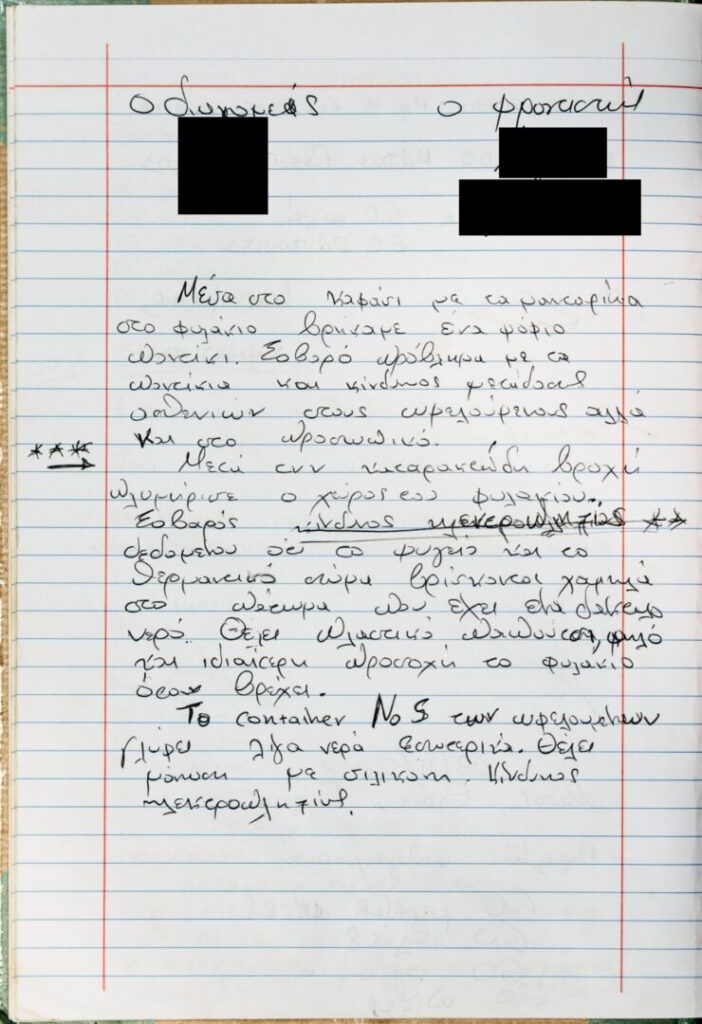
Text in English:
18/11/2018 Inside the box with the mandarin oranges we found a dead rat. Serious problem with the rats and danger of infusion of diseases to the beneficiaries and the personnel. After the torrential rain the space inside the guardroom flooded. Major danger of electrocution given that the fridge and the heating body are positioned low on the floor which has a finger of rain. When it rains, a pair of high plastic shoes and peculiar attention are needed. Container No5 of the beneficiaries is absorbing some water inwards. It needs insulation with silicone. Danger of electrocution.
A notebook that documents Moria’s horrifying story
Till the evening of September 8, 2020, when multiple fires razed it to the ground, Moria had been Europe’s most notorious refugee facility, synonymous for years with dehumanising and dangerous conditions for its thousands of residents.
Walking around the burnt periphery of the camp — which is located on the Greek island of Lesvos — in the aftermath of the fire, in what used to be the so-called “jungle” (a former olive grove surrounding the initial structure on which hundreds of makeshift tents were set up), one of the two authors of this article, reporter Stavros Malichudis, found a notebook. It was nestled in the ground, amid destroyed tents, burnt possessions, and soot that painted the area black.
The hardcover exterior of the book possibly helped it survive the fire. Its contents cover a time span of roughly six months, from November 3, 2018 to May 7, 2019.

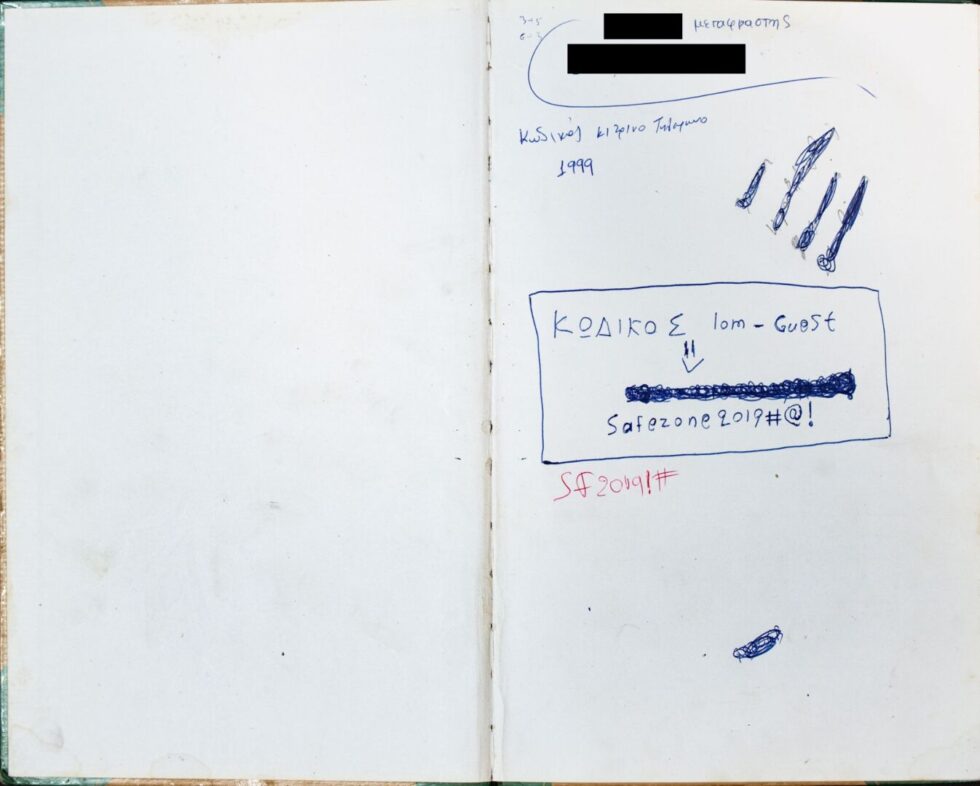
It turns out to be the day-to-day diary that was maintained by eleven employees of the “International Organization for Migration”, an intergovernmental organization that is affiliated with the United Nations and was responsible for the so-called “safe zone” in Moria.
According to IMO, its team at the safe zone consisted of “child protection workers, psychologist, lawyers, caregivers, nurses [and] interpreters to assist children and cover all of their needs.”
The safe zone was where the unaccompanied minors in the camp lived under supervision, often for months, while they waited to be transferred to the Greek mainland or to other European countries. The fenced area was set up to provide these minors with better protection than was available in the rest of the camp. They were allowed to leave during the days, but should stay inside at night.
Moria’s unsafe living conditions have been reported extensively. At the beginning of 2020, Investigate Europe — together with the Greek investigative network Reporters United — published an investigation about the jailing of minor migrants who were made to live across European countries. As part of this investigation, IE also reported about the unsafe conditions in Moria.
Solomon has reported extensively on the precarious living conditions of Moria camp. In January 2020, Solomon published an investigation into the causes that led to “a dozen deaths foretold” in a refugee facility, in which its inhabitants admitted that “security here is a big issue”.
The entries of the notebook, discovered in the ashes of Moria, confirm the shocking reality that Europe’s most vulnerable asylum seekers were left to endure. Written from the perspective of the people who were there to protect the unaccompanied minors, it reveals their helplessness and inability to do so. Care workers, like Fanis, also used the book to raise an alarm and complain about the inaction of the authorities.
When the minors were outside of the protected area, almost anything could happen to them.
The logbook reveals the constant, never-ending technical insufficiencies, the deep psychological struggles that the minors experienced because of their confinement in Moria, and the dangers awaiting them in every corner — not just outside the safe zone, but inside it as well. It depicts a reality in which the danger of electrocution seemed not only to be embedded in everyday life, but was far from being the sole concern.
How we worked
The personnel signed the pages of the logbook with their names; most of the time, they used only their first names, but sometimes, they included their last name. The care workers referred to the minors by their full names. We are only publishing the initials of the minors’ first names, and have altered the names of the care workers, in order to protect their privacy. All quotes are attributed exactly as they were written by the social workers (translated from Greek), and all underlined words and punctuation follows the original text by the care workers in the logbook.
Constant darkness over the safe zone
Lack of electricity — caused by heavy rainfalls or other incidents — is an issue that often appears in the 190 pages of the notebook. Sometimes, the problem was not fixed for days.
An absence of electricity at night meant that the staff were unable to supervise the two sides of the barbed wire, which is what separates the safe zone from the rest of the facility. Checking who attempts to enter or exit the safe zone was an important task. After all, it was the caretakers’ task to make sure the minors were safe while they were in the safe zone.
So, on November 24, 2018, with a power shortage that has already lasted several days, the care worker on shift opens the notebook. It is the shift of Fanis, Maria and Giannis. Their tone sounds desperate.
“The inaction of the people in charge is resulting again in us not having electricity, and not having even one light inside and outside of the safe zone,” the note says. “Almost daily, we bring torches from our houses, and in conditions of full darkness, we try to see who jumps inside and who jumps outside of the safe zone. These conditions are unacceptable, and no matter the daily complaints of the care workers for long, the situation does not seem to be improving.”
The writers’ worry seemed well-warranted. When the minors were outside of the protected area, almost anything could happen to them.
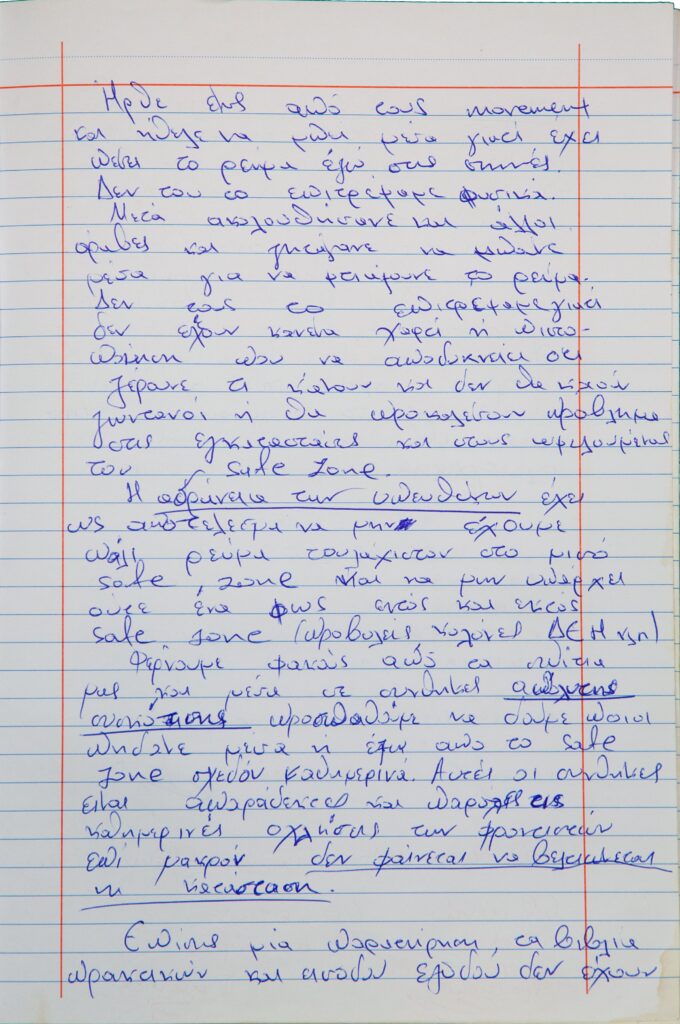
Text in English:
[…] The inaction of the people in charge results to us again not having electricity at least in the small safe zone and to not having even one light inside and out of the safe zone (floodlights, electric pillars etc). We bring torches from our homes and in conditions of full darkness we try to see who jumps inside or outside of the safe zone almost daily. These conditions are unacceptable and no matter the daily complaints of the care workers for long the situation does not seem to be improving.
A Christmas note…
On the top of the page, a “Merry Christmas!!!” in big, clear letters stands out among other notes that appear to be hastily written. It is 25 December 2018 and S., a female minor who resides in the safe zone, has just passed a piece of paper with a name on it to the social workers.
It is the name of her abuser. The care workers jot the name down on the book with a pencil, among other notes made with a blue pen.
“It’s someone who beat her outside of the safe zone while he was drunk,” they add. “We called the police, the officer sent the patrol officers. Let’s see what will happen.” The entry is signed by Fanis and Dimitris — their resigned tone indicating that they don’t actually expect much action to be taken.
Earlier that day, a man had approached the entrance of the safe zone (it’s not clear from the log whether it’s the same man). While talking with the care worker, he accused the minor girl, S., of stealing money from him. The man had given her money on many instances, he claimed, “in exchange for things that can’t be described…”
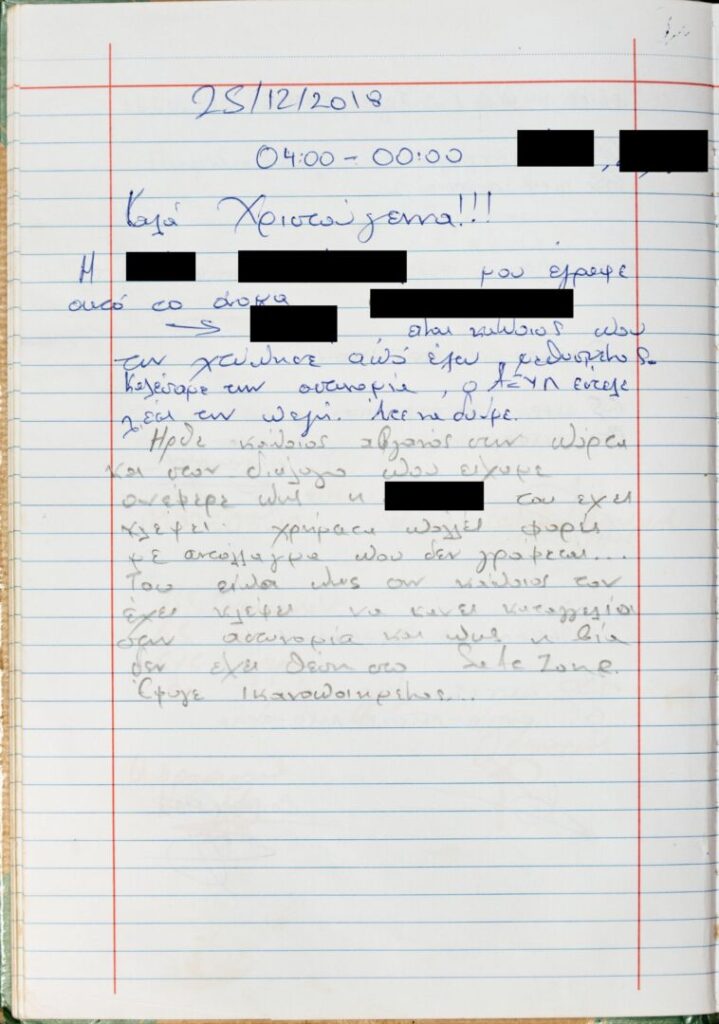
Text in English:
25/12/2018 Merry Christmas!!! S. wrote this name for me. It’s someone who beat her outside of the safe zone while he was drunk. We called the police, the officer sent the patrol officers. Let’s see what will happen. Some Afghan man came to the door and in the discussion we had he mentioned that S. had stolen money from him many times in exchange for things that can’t be described… Signed by: Fanis, Dimitris
The social workers had sent him away, telling him that if someone had stolen money from him, he should go to the police, and that violence has no place in the safe zone. “He left satisfied…,” the notes say, leaving it unclear whether there were consequences for the man or whether the abused girl received the necessary help.
In related questions addressed to IOM from Solomon, Investigate Europe and Reporters United, IOM answered that “psychological support to children to prevent or address any arising conflicts” was granted under its supervision.
… and minors’ encounter with Moria’s reality
Sexual exploitation, as implied in the above incident, is one of the dozens of dangers that minors face from the moment they cross the fence to enter the safe zone. Other major problems include alcohol or drug abuse or getting involved in serious fights.
On the evening of April 6, 2019, male minor N. is reported to “have made inhalations of the liquid used to refill lighters, as usual, and started to act in a weird way”. After some time, he starts pelting stones at the containers, smashing windows. “The officer was informed, they came quite quickly, but N. jumped off the fence and left,” states the entry.
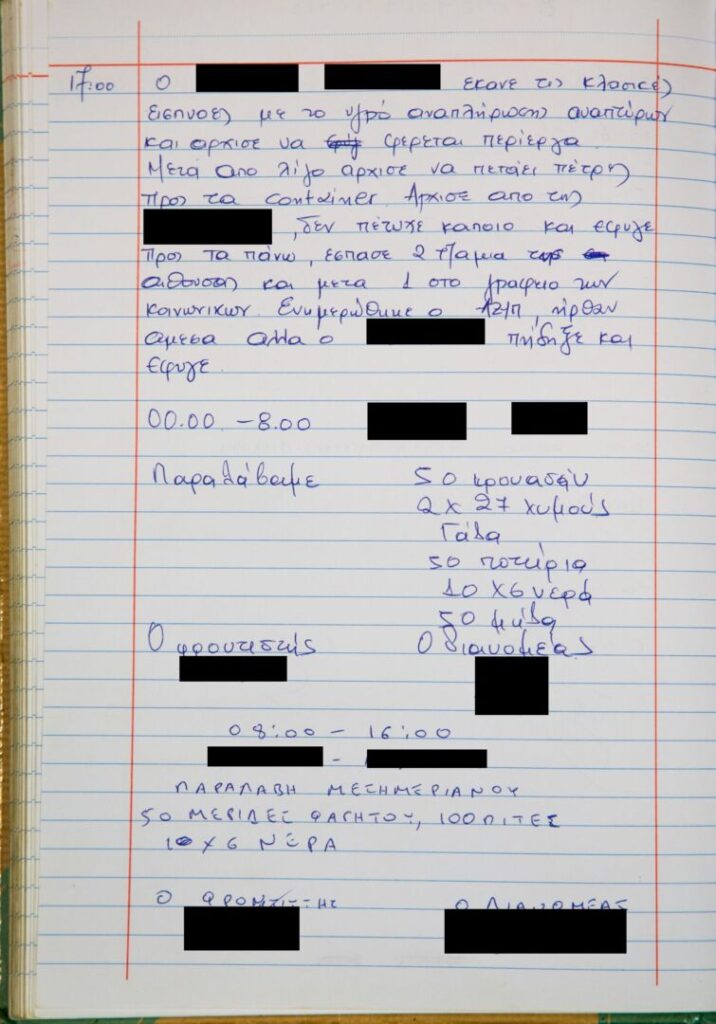
Text in English:
17:00 N. did the usual inhalations with the liquid of refilling lighters and started to behave weirdly. After a while he started throwing stones to the containers. He started from Amelias’s, didn’t hit one and went upwards, broke two windows of the room and one at the office of the social workers. The officer on shift was informed and came quickly but N. jumped and left. Signed by: Antonis, Maria
There are numerous cases reported in the logbook, sometimes on consecutive days, describing minors who return to the safe zone drunk or stoned. In some cases, they cause disturbances to the other residents or care workers, engaging in altercations.
“Fuck Moria!”
Sometimes, the care workers appear to be unable to handle a situation and need to ask for the intervention of the police present in the camp to calm things down.
“*We are still alive!!!*” a note signed by the care workers Dimitris and Iosif concludes on the night of December 6, 2018. “As Q., H. and A. came back from outside, they were probably drunk (maybe even high) and insulted us by saying ‘fuck you, fuck police, Moria’ etc.”
Verbal insults are not the only thing that take place that night. The logbook provides a detailed description of the events that happened before the police — after trying for 40 minutes — finally managed to calm down the minors, eventually taking the three boys to the police station.
“It’s nice to be crazy,” the minor named Q. keeps on shouting to the care workers. His outburst is translated into a number of damages: “There are 13 windows broken, we did not check the closets, but estimate three or four of them too, and rubbish bins are also among the broken items.
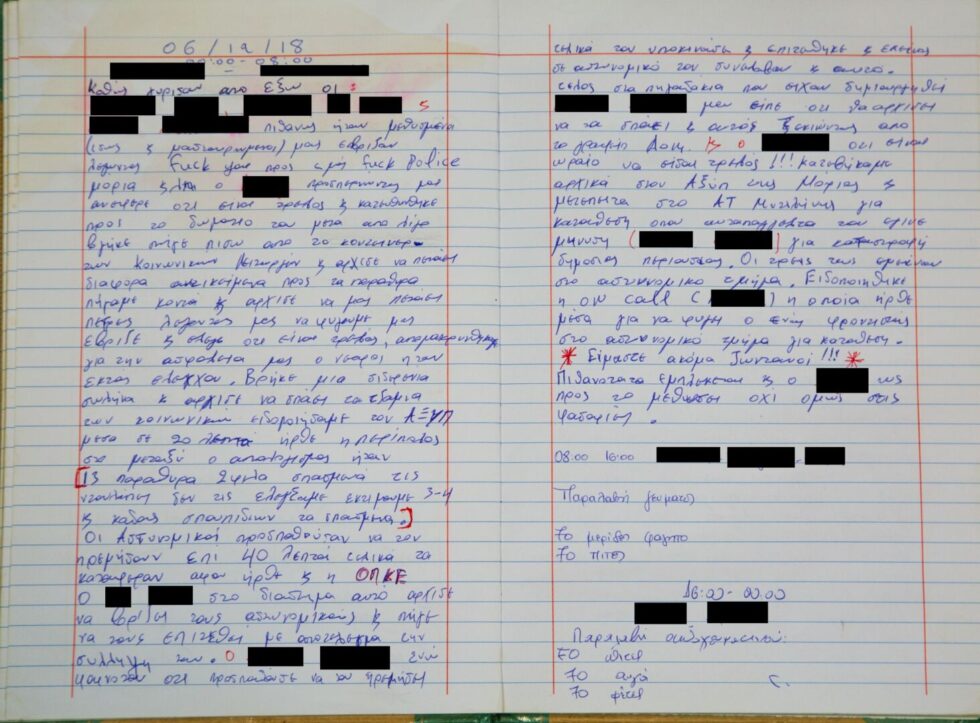
Text in English:
6/12/18 As Q., H. and A. came back from outside, they were probably drunk (maybe even high) and insulted us by saying ‘fuck you, fuck police, Moria’ etc. While crossing us I. said that he is crazy and went to his room. After a while he got outside, went behind the containers of the social workers and started to toss various objects to the windows. We went close to him and he started to throw stones to us telling us to leave. He was calling us names and was saying that he is crazy. We walked away for our safety, the young boy was out of control. He found an iron tube and started to smash the windows of the social workers’ [containers]. We contacted the officer on shift. In 20 minutes the walking patrol came. […] The Policemen were trying to calm him down for 40 minute. In the end they managed it after the special unit came too. A. in this period of time started to call names the policemen and tried to attack them, resulting in his arrest. A. while he seemed to be trying to calm him down, in the end he was inciting him and he attacked an officer too and he was also arrested. Finally, in the discussions that followed A. told me he would start smashing things too starting from IOM’s room. And S. [told] that it is nice to be crazy!!! We firstly went to the officer in shift of Moria and later to the Police Station of Mytilini to testify, where a sue against I. for damage to public property was made. The three stayed at the police station. The on call colleague was informed and came on time so one of the care workers could go to the Police station to testify. *We are still alive!!!* Possibly S. is also involved in getting drunk but not in the events that followed. Signed by: Dimitris, Iosif
Tensions among the minors
Previously, Solomon, Investigate Europe and Reporters United have extensively recorded that the overcrowded and dire conditions at the Moria camp fuelled tensions between residents of different ethnic and national groups.
In the winter of 2020, Investigate Europe and Reporters United published findings about the dire conditions endured by minor asylum seekers across the continent, including at Moria.
“They stand in line. There are queues in front of the toilets. There are queues to shower, often in cold water,” we wrote in our report. Swedish aid worker Patric Mansour, who had worked in Moria since the early launch of the camp, told us that the high levels of stress and frustration were created by an everyday life that was governed by “delays in all areas”.
And now that Moria has burnt to ashes – has the situation for the minor asylum seekers arriving on Lesvos improved?
“All the frustration is placed on the individual, who lives in uncertainty,” he said. “There is violence and crime. People fight for little things because of stress.”
“We don’t have anything specific to do during the day here and that’s what drives us crazy. That’s why people end up arguing with each other,” people who lived at Moria told Solomon when we visited Lesvos last February. Most of the people we met had witnessed violent incidents.
The logbook shows that minors were also affected by the violent conditions in the camp and violence is transcribed as part of everyday life. For example, on November 26, 2018 a fight among two boys leads to one more getting involved, and finally ends with one of them being taken to the doctor.
A week later, on December 2, 2018, two brothers attacked a third boy with an iron and a wooden pole. Incidents like the ones above are often mentioned in the care workers’ entries, with a tone that shows that they are not surprising.
Health issues in the safe zone
Sometimes though, the minors direct the violence towards themselves.
On November 6, 2018, the female minor S. — who would later report about the abuse — harms herself with a razor inside the girls’ showers, and is brought to the doctor. “The wound was deep,” says the entry. On March 8, 2019, another female minor, mentioned as A., also cuts herself and is brought to the local hospital to be seen by a psychiatrist.
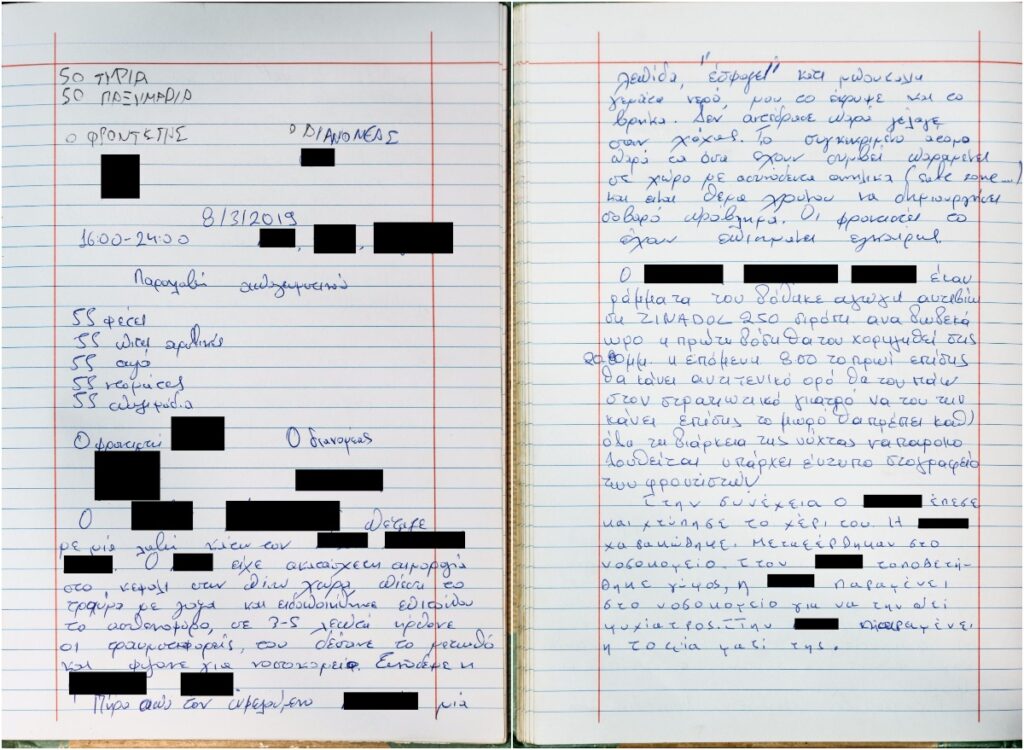
Text in English:
I took a blade from beneficiary N., he was “stabbing” some bottles of water, he hid it from me and I found it. He didn’t react but he was only laughing. The specific person no matter what has happened remains in a place with unaccompanied minors and it’s a matter of time to create a serious trouble. The caregivers have mentioned that on time. […] Then, N. fell down and hurt his hand. M. cut herself. They were taken to the hospital. N. had plaster put on his hand, while M. remains at the hospital to be seen by a psychiatrist. On call colleague is with her. Signed by: Fanis
Other entries in the notebook similarly highlight the psychological traumas experienced by the children in the camp.
Intervention by the camp’s military doctor is often needed, and in a number of cases, minors have to be escorted to the island’s hospital. Even so, they do not always receive the help they need.
On the night of December 1, 2018, a baby who lives with her teenage mother in the girls’ section does not stop crying. “We took [the baby] to the military doctor of the camp, but he told us that he has no expertise on babies and that someone should see it tomorrow,” the care worker writes, adding that the baby could possibly have chicken pox.
That night, the work in the safe zone is once more affected by the power shortage, making it unable to provide the baby with any heating against the cold December night.
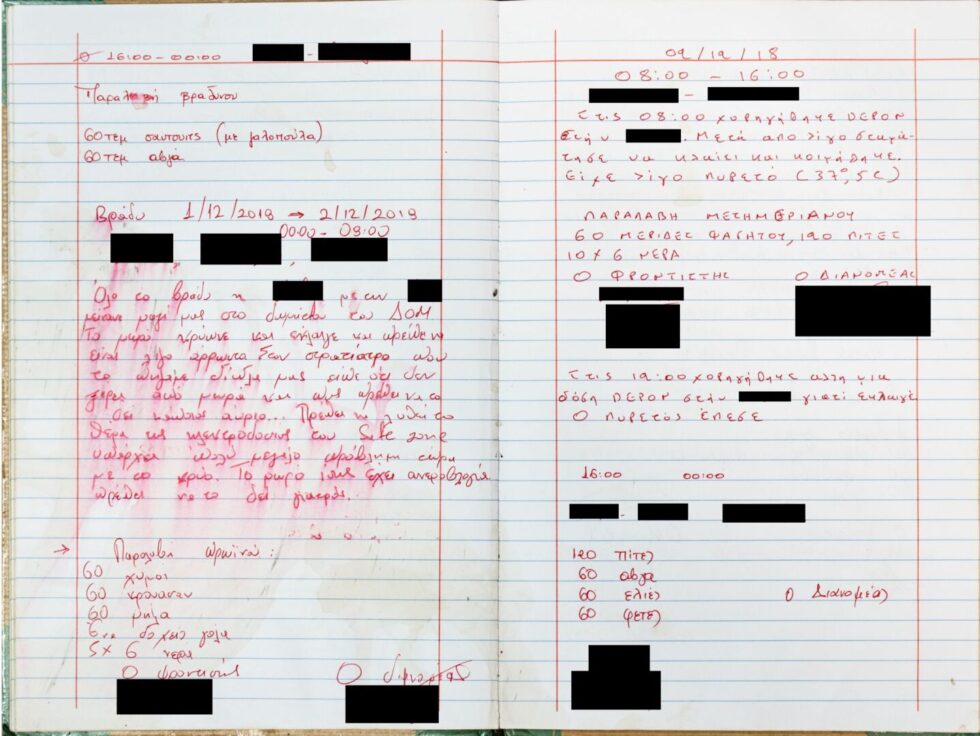
Text in English:
All night long S. and H. stayed with us in IOM’s room. The baby was cold and crying and it must be a little sick. We took [the baby] to the military doctor of the camp, but he told us that he has no expertise on babies and that someone should see it tomorrow. A solution should be given to the issue of electricity in safe zones. There is a very big problem now with the cold weather. The baby might have chickenpox. It should be seen by a doctor. […]
Repeated warnings fall on deaf ears
The log of December 7, 2018, is somewhat longer than that of most days, and includes two different kinds of warnings — spanning two pages — from Fanis, the social worker on shift.
Regarding events that took place the previous night — which resulted in police intervention — Fanis writes, “It is obvious that there is a great inactivity in the management and supervision of the section, despite our constant complaints and warnings. We will keep informing and working in unprecedented and unacceptable conditions, and let us all wish that there will not be more serious incidents with beneficiaries and colleagues.”
The care worker goes on to add that ten more Afghan boys were transferred to the safe zone the day before, and warns that transfers of this volume could fuel tensions in the small community of the safe zone.
“The ‘old ones’ feel that they need to prove something, and the ‘newcomers’ feel the pressure of the new society in which they have entered. Transfers of beneficiaries should take place gradually, as their number as well as their nationality matter, otherwise events like that of yesterday will continue to overturn the reality of the safe zone.”
But that is not the only concern the care worker expresses that day. Fanis notes that older boys, involved in acts of violence in the past, appear to remain in the safe zone, causing anxiety to the caregivers. In the logbook, they chronicle encounters with them, and warn of similar events happening in the future.
“In the least, it is problematic to see mothers with babies, unaccompanied young boys and criminal elements, even persons holding knives and makeshift weapons, living together for months in the same place. The role and the cause of existence for the safe zone needs to be redefined and this is a discussion that has to take place with no further delay,” the note concludes.
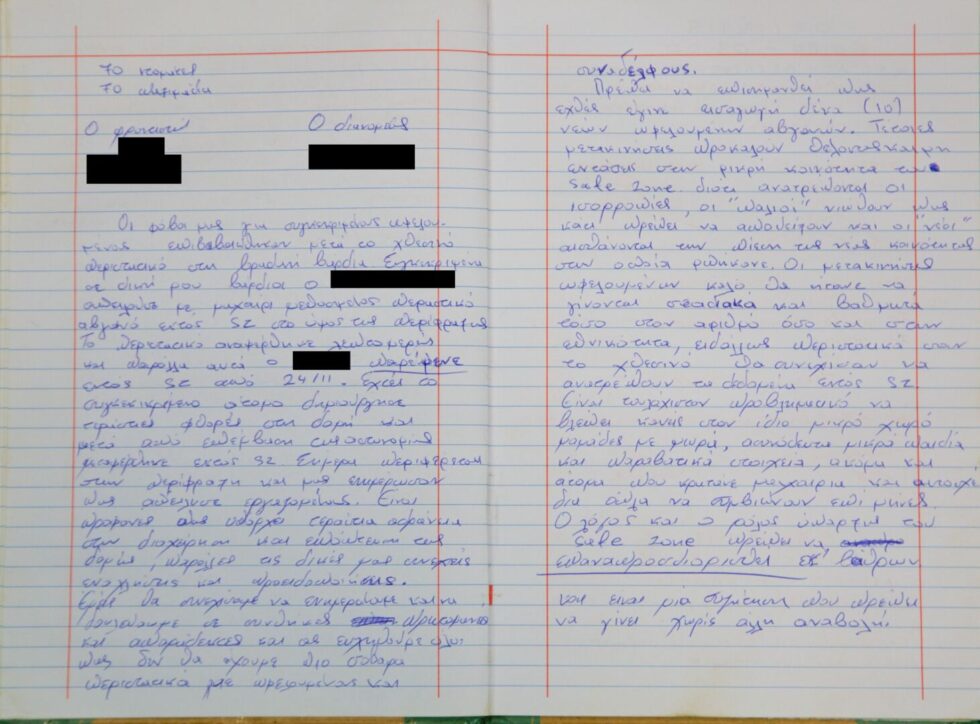
Text in English:
7/12/2018 Our fears for specific beneficiaries were confirmed after the event that took place in yesterday’s night shift. Specifically, on my shift I. was drunk threatening a passerby Afghan outside of the SZ (safe zone) close to the barbed wire. The event was reported in detail and despite this I. was remaining in the safe zone since 24/11. Yesterday this person created huge damages to the facility and only after the intervention of the Police was he taken out of the SZ. Today he was walking around the barbed wire and we got informed that he threatened personnel. It’s obvious that there is a huge inaction in the management and supervision of the structure, despite our constant complaints and warnings. We will keep to inform and work in unprecedented and unacceptable conditions and let us all hope that we will not have more serious incidents with beneficiaries and colleagues. (…) It’s at least problematic to see mothers with babies, unaccompanied young children and outlaws, even people holding knives and makeshift weapons at the same place living together for months. The cause and the role of existence of the safe zone needs to be redefined from deep and this is a discussion that needs to take place without further postponement. Signed by: Fanis
It appears from the logbook that the competent authorities did not take the required action. Incidents, including violent conflicts between minors, do not stop after this entry, but continue for as long as the book covers.
Answering the questions we asked, IOM stressed that they worked “in close coordination and under the guidance of the Reception and Identification Center (RIC)” which means that the responsibility for any important decisions lies with the Greek authorities. The Ministry of Immigration and Asylum did not respond to any of our questions.
On the day of the last entry — May 8, 2019 — there were 4,752 people living at Moria, even though its capacity at the time was only 3,100. The safe zone had a capacity of about 150 unaccompanied minors but in the time span of the logbook, there were between 300 and 600 living there.
Just three months after that last entry, on the night of August 25, 2019, another incident took place. Just like the care workers had feared, violence erupted. A 15-year-old boy from Afghanistan was stabbed to death in the safe zone.
No provision for unaccompanied minors in Moria 2.0
And now that Moria has burnt to ashes – has the situation for the minor asylum seekers arriving on Lesvos improved?
In the aftermath of the fire, Solomon was present on the island, providing on-the-ground reporting on the troubled conditions in which thousands of victims of the fire were left to endure for about a week.
After the destruction of the structure, the 400 unaccompanied minors that were then living in the safe zone of Moria were transferred to the mainland. According to the UNHCR, to date seven countries in the European Union have accepted 321 of them.
As new arrivals are happening in Lesvos again, it is unclear at this time where the unaccompanied minors arriving on the island will be accommodated.
The new structure, often referred to as “Moria 2.0”, has been set up in a former shooting range of the Greek army. The people who live there today are only provided with food once a day, and although eight weeks have passed since the camp was created, there are still no showers.
Residents told Investigate Europe, Reporters United and Solomon that they have to shower in the open, while parents bathe their children in the nearby sea. The families live in tents, without beds or solid foundation, which were flooded by the season’s first rain storms, while up to 100 single males share big tents, sleeping on bunk beds.
So far, there is no area in which unaccompanied minors can live separately from the rest of the population. As of publication, the Greek ministry has not responded to Solomon’s request for comment.
However, for the time being, in this new reality for the most vulnerable among people seeking refuge in Europe, there isn’t even a “safe zone” anymore.
—
* The reporting for this article was done in a collaboration between Investigate Europe, Solomon and Reporters United. Other media partners for this story include Tagesspiegel, Vice (Germany), openDemocracy, Publico, Mediapart, WP Magazyn, Klassekampen, infoLibre, Rheinpfalz.

